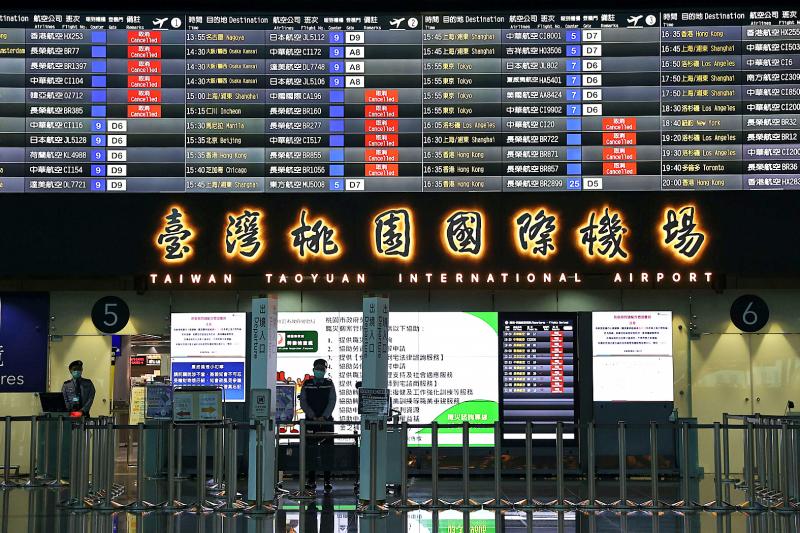Washington rejected Taiwan’s application to join the US border preclearance program because it aims to first prioritize areas with a greater security threat, Minister of Foreign Affairs Joseph Wu (吳釗燮) said yesterday, adding that Taiwan is still pursuing membership.
Taiwan in 2020 applied to set up a US Customs and Border Patrol (CBP) preclearance facility at Taiwan Taoyuan International Airport, meant to expedite travel to the US by allowing passengers to submit to immigration and customs inspections before boarding their flight.
However, the CBP last year rejected the application.

Photo: Ann Wang, Reuters
At a routine hearing of the legislature’s Foreign Affairs and National Defense Committee, Wu denied a legislator’s claim that the application was rejected due to the airport’s relatively small capacity.
The actual reason was because Taiwan does a good job at maintaining security and therefore does not pose a considerable security threat to the US, he said, adding that Washington aims to concentrate on other places first.
One major benefit for the US in setting up preclearance facilities is to catch security threats before they touch down on US soil, rather than turning them away once they have arrived.
However, Taiwan is still seeking acceptance into the program, Wu added.
Apart from the US Department of Homeland Security, which is not discussing the matter at present, other US agencies agree that Taiwan should be included, he said.
In December last year, a group of US senators introduced a bill that would require the CBP to submit a report analyzing the effects of setting up a preclearance facility in Taiwan and other Indo-Pacific nations.
It has not yet been put to a vote.
Meanwhile, Wu denied that Taiwan’s representative to Russia was “rebuked” over something the minister had written on Twitter last month criticizing Moscow’s invasion of Ukraine.
Taiwan People’s Party Legislator Chiu Chen-yuan (邱臣遠) said at the hearing that he had received a tip that Representative to Russia Keng Chung-yung (耿中庸) was summoned to the Russian Ministry of Foreign Affairs and rebuked for something Wu had written on Twitter on Feb. 26, two days after Taipei formally condemned the invasion.
Calling it “Russia’s savage war,” Wu wrote that “Taiwan stays vigilant & knows who to side with. We condemn & sanction the aggressor.”
Wu confirmed that Keng attended a meeting at the ministry, but denied mention of the Twitter post.
The meeting was part of regular interactions between the two sides “to exchange opinions,” he said.
Wu also reiterated that sanctions on Russia would not affect Taiwan any more than other countries, even with its inclusion among 48 countries and territories on Russia’s “unfriendly” list.

The inspection equipment and data transmission system for new robotic dogs that Taipei is planning to use for sidewalk patrols were developed by a Taiwanese company, the city’s New Construction Office said today, dismissing concerns that the China-made robots could pose a security risk. The city is bringing in smart robotic dogs to help with sidewalk inspections, Taipei Deputy Mayor Lee Ssu-chuan (李四川) said on Facebook. Equipped with a panoramic surveillance system, the robots would be able to automatically flag problems and easily navigate narrow sidewalks, making inspections faster and more accurate, Lee said. By collecting more accurate data, they would help Taipei

TAKING STOCK: The USMC is rebuilding a once-abandoned airfield in Palau to support large-scale ground operations as China’s missile range grows, Naval News reported The US Marine Corps (USMC) is considering new sites for stockpiling equipment in the West Pacific to harden military supply chains and enhance mobility across the Indo-Pacific region, US-based Naval News reported on Saturday. The proposed sites in Palau — one of Taiwan’s diplomatic allies — and Australia would enable a “rapid standup of stored equipment within a year” of the program’s approval, the report said, citing documents published by the USMC last month. In Palau, the service is rebuilding a formerly abandoned World War II-era airfield and establishing ancillary structures to support large-scale ground operations “as China’s missile range and magazine

A 72-year-old man in Kaohsiung was sentenced to 40 days in jail after he was found having sex with a 67-year-old woman under a slide in a public park on Sunday afternoon. At 3pm on Sunday, a mother surnamed Liang (梁) was with her child at a neighborhood park when they found the man, surnamed Tsai (蔡), and woman, surnamed Huang (黃), underneath the slide. Liang took her child away from the scene, took photographs of the two and called the police, who arrived and arrested the couple. During questioning, Tsai told police that he had met Huang that day and offered to

BETTER SERVICE QUALITY: From Nov. 10, tickets with reserved seats would only be valid for the date, train and route specified on the ticket, THSRC said Starting on Nov. 10, high-speed rail passengers with reserved seats would be required to exchange their tickets to board an earlier train. Passengers with reserved seats on a specific train are currently allowed to board earlier trains on the same day and sit in non-reserved cars, but as this is happening increasingly often, and affecting quality of travel and ticket sales, Taiwan High-Speed Rail Corp (THSRC) announced that it would be canceling the policy on Nov. 10. It is one of several new measures launched by THSRC chairman Shih Che (史哲) to improve the quality of service, it said. The company also said